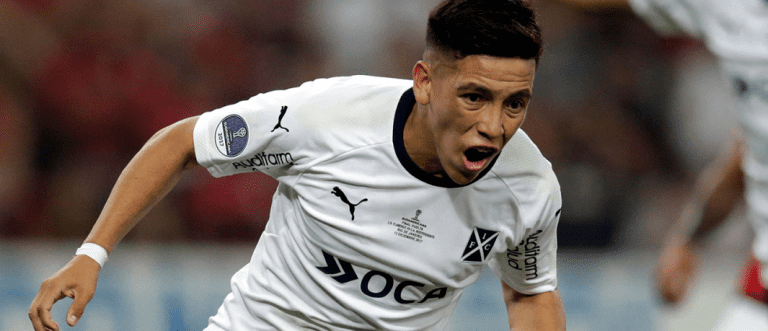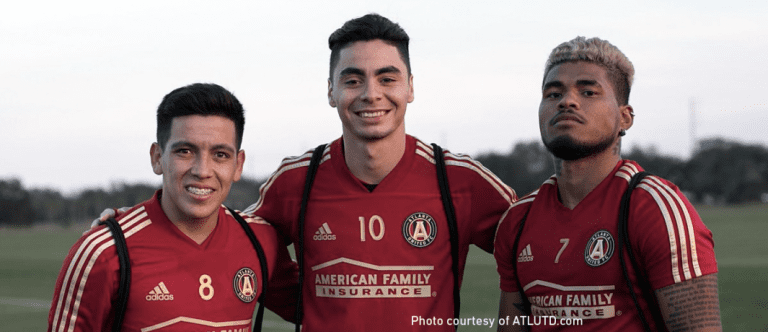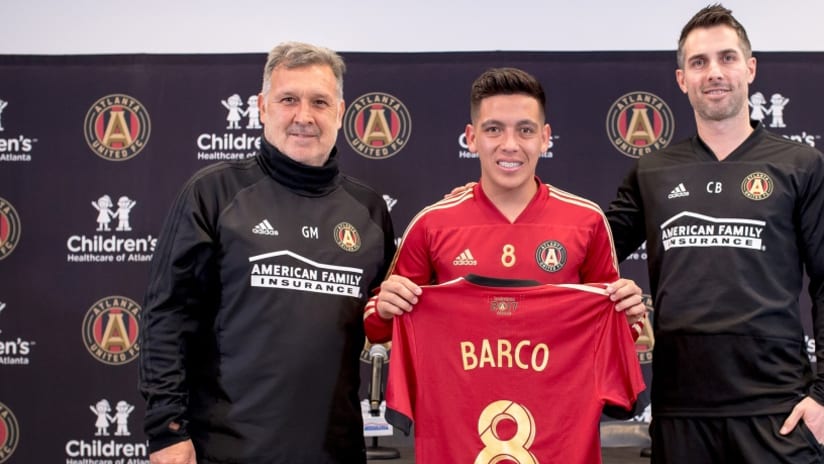MARIETTA, Ga. – Atlanta United technical director Carlos Bocanegra knew what the phone calls meant before he picked them up.
In a months-long negotiation that necessitated multiple trips to Argentina, more than a few stop-and-go discussions and plenty of near-misses, a call from Atlanta’s vice president of soccer operations Paul McDonough or another figure in the negotiations around prized target Ezequiel Barco usually meant something had gone wrong.
“There were a lot of those,” Bocanegra told MLSsoccer.com. “There was some, ‘Alright, we’re making progress … oh man, it’s never going to happen’ [moments].”
Atlanta president Darren Eales classified the transfer as the most difficult deal of his career, but one he said was worth it because of what it could mean on multiple levels – to the club, to Major League Soccer and to the player.
The implications for Barco are only beginning to reveal themselves. The teenage star’s MLS career is only now truly ramping up – he scored his first MLS goal on Saturday in a 2-1 win over the Chicago Fire – and the value of the richest transfer in league history is starting to be measured on the field.
How Barco got to MLS, however, and what it signals about the league’s growth is a chapter already written, and it’s one that will mean as much to the 19-year-old Argentinian’s legacy as anything he accomplishes with the ball at his feet.
It was groundbreaking not just in its financial cost, but also in the stature of prospect heading to a still-growing league.
“Perhaps five years ago,” Eales said, “the deal doesn’t happen.”
Unwavering in the face of pressure

Barco with Independiente
What is pressure if it’s not stepping up to take a Cup-deciding penalty kick in front of 62,567 people in the storied Maracanã, the hopes of an entire club on your teenage shoulders?
Is it throngs of media outlets writing that you’re too good for a move to MLS? Or influence exerted from every and any angle – on you, on your family, on your agent – to scrap a deal that was already agreed in order to facilitate a higher-profile transfer?
The attributes that make an 18-year-old kid special – $15 million special – go beyond on-field skill and goal-scoring ability. Atlanta United is confident Barco has that something else. It is a quality that’s not easy to put a finger on, but it screams “exceptional.”
It was that exact makeup that both confirmed to Atlanta that Barco was worth every penny asked – and also nearly tanked the deal that brought him to MLS. It was on display when Barco stepped up to the penalty spot in the second leg of the Copa Sudamericana final and buried the kick to lead his club to the title. It was also there when Barco held his ground against what can only be delicately described as less-than-ideal levels of pressure exerted on him during the transfer process.
It is there even now, when the quiet teenager is asked about his ability to ignore all of those ugly outside forces in order stick with his word and go to Atlanta.
“I distracted myself so I wouldn’t be involved in the deal,” Barco told MLSsoccer.com in his native Spanish, barely a shrug to acknowledge a trying few months. “I went on vacation for a few days with my girlfriend and was distracted, I didn’t use my phone, and that’s why, luckily, in one day it all got done.”
It was hardly a one-day deal.
It began months earlier, during MLS All-Star Week, when Atlanta’s top decision-makers flew down to see Barco play and then meet him after the game in an Argentinian steakhouse in the late-night hours. It continued through months of negotiations, with McDonough making several trips down to Argentina to negotiate the price tag.
By the time Barco took that penalty, it only confirmed to Atlanta’s decision-makers that the midfielder had “it.” That career-defining moment also made them worry they had lost him. Eales said he tried to explain to Atlanta United owner Arthur Blank that their target had played so well in the tournament he might have played his way out of the deal to come to MLS.
Team officials joked the price “certainly didn’t go down” after Independiente’s Copa Sudamericana run. They wouldn’t confirm just how far it went up.
The price wasn’t the only thing that increased. Speculation around the deal blared loudly, as did the voices and influencers who wanted to see the star head to Europe, not to MLS. This was a player good enough for an early call-up to train with Argentina’s senior national team. Good enough to lead Independiente to a title. How could MLS be the right destination?

Carlos Bocanegra with Tata Martino | Atlanta United
But as newspapers dispatched stories about why Barco was a better fit for Europe, and as other voices tried to turn Barco’s eyes away from North America, the midfielder did not waver in the word he had given Atlanta. Not even when top European teams like Atletico Madrid and Borussia Dortmund were reported to have entered the picture.
He was so committed to honoring the deal, he gave a significant amount of money – reports pegged it at around $1 million – to build fields for Independiente in order to seal the transfer.
“I was fair to Atlanta,” Barco said. “And I said I wanted to come here.”
Barco's unshakable vision of coming to, and succeeding at, ATLUTD, made the club feel confident that there would be nothing MLS could offer that would shake him. Not even being tagged with the label of “biggest transfer in league history.” Barco’s resolve only doubled down Atlanta’s determination to seal the move.
“The fact that he had the [guts] to take that penalty in the final, whilst it prolonged the deal, it further emphasized his mental toughness,” Eales said. “That has shown both in the way he handled himself in the transfer and what he’s done on the pitch.”
When the official transfer finally came through as team officials sat at the team’s table at the MLS SuperDraft in Philadelphia, officials joked Eales got a tear in his eye.
It was a sense of relief more than a celebration – and the hardest part may be yet to come.
A new tier of prospect

Barco (L) with Miguel Almiron and Josef Martinez | Atlanta United
Atlanta United’s three top front-office officials sat in a box in Argentina watching Barco play last fall. Over their shoulders a TV in the suite was showing the Five Stripes’ game against the Philadelphia Union.
The moment perfectly encapsulated the growth of MLS over the last few years. The access to the league has changed around the world, escalating along with the level of play on the field. The success of Atlanta, and players like Miguel Almiron and Leandro Gonzalez Pirez, has raised awareness of the league in South America.
It’s a reason why the Five Stripes could insert themselves into the discussions around one of the country’s most prized prospects.
“This league has grown to a level where you can have that conversation and not get laughed out the door,” Eales said. “There is a sense of going from strength to strength. The TV presence it has, there is a real sense this is a league where you can develop. … This isn’t the cul-de-sac of a career, this is a league you can come to and get better.”
An injury just before the season allowed Barco to quietly slide into Atlanta’s lineup without much fanfare last month. It was hardly a grand welcome for a player who might be the most prized prospect ever to play in MLS.
Barco is already on Argentina’s senior national team radar, having traveled with the team last year to integrate within the group. His career trajectory could explode sooner than later, especially if he features for Argentina’s squad at next year’s U-20 World Cup in Poland. While his teammate Almiron may be the first to head to the big stage in Europe, Barco may not be far behind.
“Hopefully he goes down [to Argentina] and is a big part of the Under-20 squad and there is hype around him and he becomes a young player within the full team of Argentina,” Bocanegra said. “The possibilities are endless.
“That’s the hope and goal, but we’re not going to put pressure on him that he needs to be the Golden Boot winner at the U-20 World Cup and be called into the Argentina selection directly after that. It might go a little different way, but we know the quality he has, he’s shown it in glimpses here, what he can do on the field, and with the amount of interest and the type of clubs interested in him before coming here, we’re proud to have landed him. Hopefully we can continue to push him and be a part of that development process while he’s here with us.”
If MLS can act as a springboard for a prospect like Barco, it could change the league’s place in the global soccer market. The capacity to purchase a top prospect is one thing. The ability to further develop and sell that player on is another.
“Once you’ve demonstrated you can do it, all you’re doing is opening the door to other possibilities,” Eales said.
Barco’s record transfer was only the first step. What happens over the next few years will be as important. The pressure is not only on Barco to live up to the hype, but on Atlanta and the league to nurture it.














